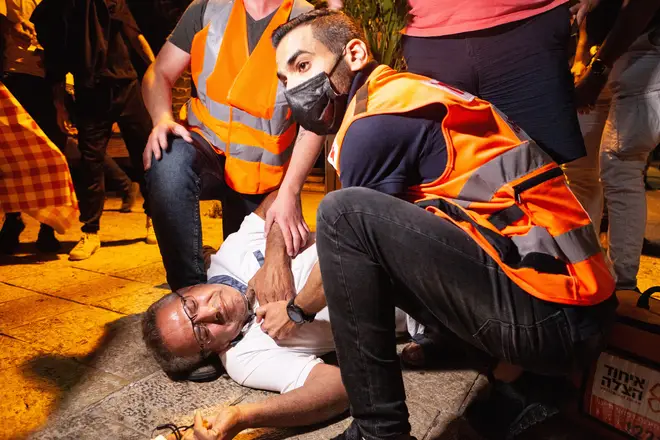
Nick Ferrari 7am - 10am
12 May 2021, 17:02

The UN’s Middle East convoy has voiced fears that the current conflict between Israel and Palestine may lead to “full-scale war”.
Since Monday, tensions in the region have risen to near crisis point.
According to Israel, more than 1,000 rockets have been fired from within Gaza, Palestine, in the last 48 hours, while Israel has launched hundreds of airstrikes on the territory - destroying two tower blocks in the process.
The death toll continues to climb, with at least 43 Palestinians - 13 of which were children - and 6 Israelis being killed in the conflict since Monday.
Here’s a brief history of the violence and the Israeli-Palestinian conflict:
Read more: PM urges Israel and Palestine to 'step back from the brink' of war
Read more: Tel Aviv targeted by rockets after Israel unleashes new airstrikes on Gaza

James O'Brien reads out powerful thread on Israel-Palestine conflict
A legal battle over property ownership has renewed tensions between Israel and Palestine.
In the Arab-majority neighbourhood of Sheikh Jarrah in East Jerusalem, a group of Palestinian families face eviction from their homes.
On Monday 10 May, an Israeli court decision was scheduled to determine whether or not to give their homes to Jewish settlers.
That same day, an Israeli nationalist march took place in Muslim neighbourhoods in the Old City, to celebrate its capture in 1967.
Since then, tensions have risen to almost crisis point, with rockets and air strikes from both sides. The UN’s Middle East convoy has warned of a full-scale war.
Read more: Israel launches air strikes on Gaza targets following rocket attacks
Read more: Hamas fires rockets at Jerusalem in response to 'Israeli aggression'

Smoke and flame rise after Israeli warplanes conducted airstrikes in Gaza City
Prime Minister Boris Johnson tweeted: "I am urging Israel and the Palestinians to step back from the brink and for both sides to show restraint.
"The UK is deeply concerned by the growing violence and civilian casualties and we want to see an urgent de-escalation of tensions."
Meanwhile, the White House expressed “serious concerns” about the conflict on Monday and said they were “closely” monitoring the situation.
President Joe Biden is facing increased pressure to do more in response to the crisis.
Read more: More than 200 hospitalised as Israeli police clash with Palestinians
Read more: Over 60 injured as Israeli police and Palestinians clash during Ramadan

'Innocent children are dying, what is Israel doing to de-escalate?'
Both Jews and Arab Muslims date their claims over the land back thousands of years, but the most recent conflict began in the early 20th century.
After the Ottoman Empire was defeated in World War One, the British Empire took over the area known as Palestine. At the time, its inhabitants consisted of a Jewish minority and an Arab majority.
Britain was then tasked with finding a “national home” for Jewish people, and over the next couple of decades, more and more Jews fleeing persecution in Europe sought a homeland. Numbers grew after the end of WW2, with many Jews displaced after the Holocaust.
Over the years, tensions have intensified, with both sides claiming ownership of the land.

Israel's Iron Dome intercepts rockets heading towards the country
In 1947, the UN voted for Palestine to be split in two, with Jerusalem becoming an international city. While Jewish leaders accepted the plan, it was rejected by Arab Muslims and never implemented.
British rulers then left a year later, before Jewish leaders created the state of Israel.
A war then followed, with neighbouring Arab countries invading; Egypt occupied Gaza, while Jordan took over a piece of land known as the West Bank.
In 1967, another war broke out, with Israel gaining a stronghold in East Jerusalem and the West Bank - both of which were dominated by Palestinians. Since, Israel has prevented them and their descendants from returning to their homes.
More than 600,000 Jews now live in these settlements, which Palestinians claim are illegal under international law.

James O'Brien reflects on the Israel-Palestine conflict
The city of Jerusalem is a holy site in both Jewish and Islamic faith (as it is in Christianity).
For Muslims, the city was the first Qibla (or the direction of prayer).
Meanwhile, in Judaism, the Old City’s Western Wall is part of the Temple Mount.